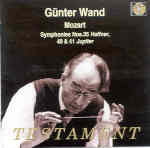Unlike his rather unexceptional Beethoven recordings recently reissued on Testament, Gunter Wand’s natural affinity for Mozart shines in these performances. While the string-heavy sound and comparative lack of attention given winds, brass, and timpani hark back to an earlier era in Mozart performance, the shapeliness of phrasing in the slow movement, firm rhythms, and solid musicianship everywhere in evidence remain timeless. The only genuine disappointment comes in the soggy tempo adopted for the finale of the “Haffner” Symphony. Otherwise, there’s very little to criticize.
In particular, these performances of Symphonies Nos. 40 and 41 merit comparison with the best. Notice how beautifully Wand floats the opening theme of the great G minor symphony atop its accompaniment, or his trenchant attack on the finale–not too fast, but rhythmically ferocious. In contrast, the finale of the Jupiter Symphony is truly “molto allegro” and still amazingly clear contrapuntally. Surely this is one of its very greatest performances on disc, a thrilling virtuoso display from first note to last. The generally fine stereo sound from the late 1950s and early ’60s, string-heavy balances aside, has hardly dated a bit. Definitely worth having! [10/20/2003]
































